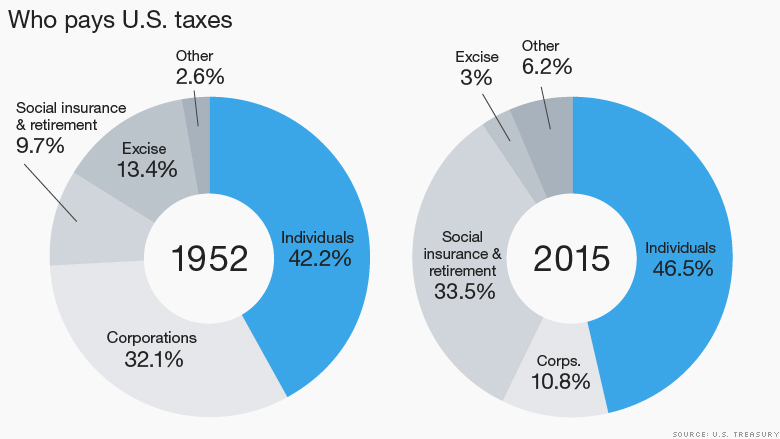
The U.S. federal government is bringing in more money in taxes than ever before.
Over $2.67 trillion has come in so far this fiscal year, according to the latest Treasury Department report. That's a record -- in dollar terms -- for the first 10 months of the year (the government's fiscal year ends in September). Expect 2015 to finish at an all-time high.
The increase in tax revenue is helping the U.S. pay more of its bills. While America still runs a deficit, the overspending has gone down substantially in recent years.
Related: Deficit continues to drop sharply - CBO
The tax 'burden' has gone up for individuals
So who pays the bulk of U.S. taxes? The burden has shifted from companies to individuals over time.
In the early 1950s, corporations accounted for over 30% of U.S. tax revenues. Today, businesses pay about 11% of taxes, according to the U.S. Treasury.
Businesses became smarter about finding ways to legally lower their tax bills over the years. Companies that operate globally moved their tax jurisdictions overseas to reduce how much they paid in U.S. taxes. Others have filed for "S corporation" status, which allows them to pass income through to shareholders, who pay taxes at a lower rate.
Related: Bernie Sanders and Donald Trump agree on 1 big issue

In the meantime, the share of taxes paid by individuals has increased. In the 1950s, individual income taxes accounted for just over 42%. Today it's about 47%.
But the biggest change has been in what is known as "Social Insurance and Retirement Receipts." Those are the taxes people and companies pay for Social Security and Medicare. Workers can see the money taken out for Social Security and Medicare on their weekly pay slips.
In the 1950s, those taxes accounted for less than 10% of tax revenues. Today it's over 30%.
The reason it's gone up so much is simple: the Social Security tax rate has been raised several times since the program started in 1937. When it commenced, the Social Security tax was a mere 2%. Now it's 12.4% for Social Security and 2.9% for Medicare.
Related: The average tax refund is now $2,893
But overall taxes actually aren't that high
Despite the big dollar numbers coming in to the U.S. coffers, it might be a stretch to call 2015 a "record" year for taxes. Experts point out that it's misleading to just look at the dollar amount.
That's because it often increases every year in the same way that the price of cars or other goods are a lot higher today than in the 1990s or 1970s. The prices of just about everything go up.
A better question to ask is whether the U.S. government is collecting more taxes as a percent of the total U.S. economy. In other words, is the government taking a bigger bite of the economy?
The answer is no. In 2015, federal taxes are on track to be about 18% of the economy. That's normal.
"It's not as catchy [to say]: 'tax receipts running at historical average,' but that's a more accurate description of where we're at right now," says Joe Rosenberg, a senior research associate at the Tax Policy Center.


